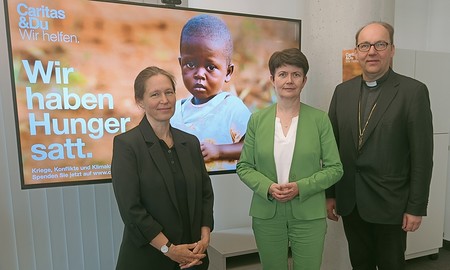“The situation in Burkina Faso has never been this bad in recent years. We urgently need donations to provide help quickly and save lives.” Julia Stabentheiner described the foreign aid so dramatically Caritas of the Diocese of Innsbruck the current situation at a press conference in Innsbruck on Wednesday. According to the latest figures, 345 million people worldwide are suffering from acute and life-threatening hunger. This is an increase of 80 percent compared to the previous year. Far more people, namely 811 million, are fundamentally affected by chronic malnutrition. Caritas expects numbers to increase due to the crises.
Bishop Hermann Glettler is very concerned about this development. But he also sees the possible solutions that the global community of faith and values - and with it Caritas – offers: “Hunger is not fate, but a clear mission. Because everything is connected with everything else: climate change, the consequences of the corona pandemic , the over-indebtedness of poor countries and global conflicts deny millions of people their basic right to food,” he emphasized. The situation in Africa is particularly critical, where Caritas is fighting courageously against hunger, food insecurity and malnutrition.
But it is not only about the real, but also about the inner hunger of the people. “That’s how confident we can act together and with determination, supported by values that are socially just and ecologically sustainable,” explained Bishop Glettler. “Out of deep conviction I ask you to support Caritas in their service to the ideal of a world without hunger.”
Multiple Disasters
Caritas Tirol has been doing this in Burkina Faso and Mali for many years. She is currently particularly challenged there. Because people are affected here in several ways: the effects of climate change lead to drought and poor harvests. And the Ukraine war brings global wheat shortages. Both together cause and amplify the hunger crisis.
Burkina Faso was the focus of the press conference. There, Caritas Tirol improves the living conditions of people affected by the humanitarian crisis. Caritas director Elisabeth Rathgeb informed: “The need is great: In Burkina Faso there are 1.8 million internally displaced persons, while 185 health centers are not functioning and over 4,000 schools are closed. We take care of education, water supply, food provision and a good coexistence in the community. Your expenses support us. Help me.”
Caritas Tirol has been supporting the construction of wells in Mali and Burkina Faso for 30 years. Clean drinking water is one of the most important ingredients for a healthy diet. And that is precisely what more than a third of the people in Mali do not have. Caritas is currently drilling new wells in villages in the diocese of Kayes (Mali) and Kaya (Burkina Faso) and old wells are being renewed. When a well is finished, it’s a festival for the whole village.
Precarious food situation
The food situation in the Sahel countries of West Africa, especially in northern Burkina, is becoming increasingly critical. Existing granaries are almost empty and it will be weeks or months before the next harvest. Crop yields fluctuate due to natural irregular rainfall and, in recent years, this has increased due to climate change. In addition, the situation is exacerbated by the precarious security situation in the country. Various terrorist groups tyrannize the rural population with assassinations and looting.
For the Caritas employee Stabentheiner, the situation in Burkina Faso is dramatic: “More than a million people have left their villages and all their belongings and fled to the larger cities, where they feel safer. Many farmers no longer have access to their fields. You cannot order these. This is particularly devastating in the savanna regions south of the Sahara.”
Added to this is the sharp increase in the prices of almost all products due to the war in Ukraine. For example, the cost of a sack of grain has tripled, and a bottle of cooking oil made locally from cottonseed has doubled. But even a product like a simple ballpoint pen costs 50 percent more. The significant increase in petrol prices certainly plays a decisive role here, which also affects other areas of life such as transport to work.
Source: catpress

